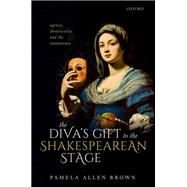The Diva's Gift to the Shakespearean Stage Agency, Theatricality, and the Innamorata
, by Brown, Pamela Allen- ISBN: 9780198867838 | 0198867832
- Cover: Hardcover
- Copyright: 2/25/2022
The Diva's Gift traces the far-reaching impact of the first female stars on the playwrights and players of the all-male stage. When Shakespeare entered the scene, women had been acting in Italian troupes for two decades, traveling¬ in Italy and beyond and performing in all genres, including tragedy. The ambitious actress reinvented the innamorata, making her more charismatic and autonomous, thrilling audiences with her skills. Despite fervent attacks, some actresses became the first international stars, winning royal and noble patrons and literary admirers in France and Spain.
After Elizabeth and her court caught wind of their success in Paris, Italian troupes with actresses crossed the Channel to perform. The Italians' repeat visits and growing fame posed a radical challenge to English professionals just as they were building their first paying theaters. Some writers treated the actress as a whorish threat to their stage, which had long minimized female roles. Others saw a vital new model full of promise. Lyly, Marlowe, and Kyd endowed innamorata parts with hot-blooded, racialized passions, but made them self-aware agents, not counters traded between men. Shakespeare, Jonson, Webster and others followed, ringing changes on the new type in comedy, tragedy, and romance. Like the comici they recycled actress-linked theatergrams and star scenes, such as cross-dressing, the mad scene, and the sung lament. In this way, the diva's prodigious virtuosity and stardom altered the horizons of playmaking even on the womanless stage. Capitalizing on the talents of boy players, the best playwrights created bold new roles endowed with her alien glamour, such as Lyly's Sapho and Pandora, Marlowe's Dido, Kyd's Bel-Imperia, Webster's Vittoria, and Shakespeare's Beatrice, Viola, Portia, Juliet, and Ophelia.
Cleopatra is not alone in her superb theatricality and dazzling strangeness. As this book demonstrates, the diva's gifts mark them all.
After Elizabeth and her court caught wind of their success in Paris, Italian troupes with actresses crossed the Channel to perform. The Italians' repeat visits and growing fame posed a radical challenge to English professionals just as they were building their first paying theaters. Some writers treated the actress as a whorish threat to their stage, which had long minimized female roles. Others saw a vital new model full of promise. Lyly, Marlowe, and Kyd endowed innamorata parts with hot-blooded, racialized passions, but made them self-aware agents, not counters traded between men. Shakespeare, Jonson, Webster and others followed, ringing changes on the new type in comedy, tragedy, and romance. Like the comici they recycled actress-linked theatergrams and star scenes, such as cross-dressing, the mad scene, and the sung lament. In this way, the diva's prodigious virtuosity and stardom altered the horizons of playmaking even on the womanless stage. Capitalizing on the talents of boy players, the best playwrights created bold new roles endowed with her alien glamour, such as Lyly's Sapho and Pandora, Marlowe's Dido, Kyd's Bel-Imperia, Webster's Vittoria, and Shakespeare's Beatrice, Viola, Portia, Juliet, and Ophelia.
Cleopatra is not alone in her superb theatricality and dazzling strangeness. As this book demonstrates, the diva's gifts mark them all.







